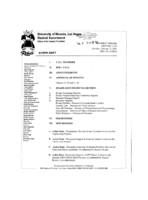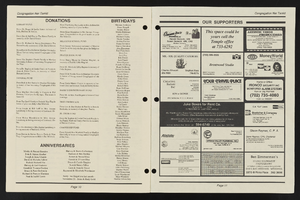Search the Special Collections and Archives Portal
Search Results

Meeting minutes for Consolidated Student Senate, University of Nevada, Las Vegas, February 12, 2001
Date
Archival Collection
Description
Text
Dunes Hotel and Casino Records
Identifier
Abstract
The Dunes Hotel and Casino Records are comprised of administrative, publicity, and entertainment materials documenting the history of the Dunes Hotel and Casino in Las Vegas, Nevada from the years 1954 to 1992. Included are correspondence, contracts, photographs, hotel budgets, and an early aerial photograph of the property. The material provides a significant amount of historical documentation of the hotel that was long known to tourists and residents as the "the Miracle in the Desert."
Archival Collection
Mabel Hoggard Papers
Identifier
Abstract
The Mabel Hoggard Papers (1903-2011) contain materials related to Hoggard's career as a Las Vegas, Nevada elementary school teacher, her research and civic interests in Las Vegas's predominantly African American Westside communities, and her engagement with civil rights issues. The collection also contains materials about Hoggard's life, including biographical newspaper articles about her childhood, education, work, and family. The collection includes lesson plans, scrapbooks, awards, correspondence, photographs, and physical objects such as a vinyl record and political pins. The bulk of the collection focuses on her life in Las Vegas from approximately 1946-1989.
Archival Collection
Dunes Hotel Photograph Collection
Identifier
Abstract
The Dunes Hotel Photographs (1950-1993) consist of administrative, publicity and entertainment images documenting the history of the Dunes Hotel and Casino in Las Vegas, Nevada. In addition to materials focusing on day-to-day activities at the hotel (correspondence, contracts, personnel, budgets, etc.) the collection provides insight into the hotel’s entertainment and public relations activities. Although there are chronological gaps in the collection, particularly during the later years of the Dunes (1970s-1990s), it provides a significant amount of historical documentation on the famed Strip hotel that was long known to tourists and residents alike as the “the Miracle in the Desert.”
Archival Collection

Transcript of interview with Daisy Lee Miller by Claytee White, March 22, 2013
Date
Archival Collection
Description
Daisy Lee Miller talks about being born and raised as an only child in Louisiana before moving to Las Vegas in her 20s. For a time, Daisy worked in the powder room at the California Club. It was while she was employed here that she realized she wanted something better, and she wanted to be a good example tor her kids. Daisy began attending the University of Nevada, Las Vegas to get her degree. Daisy is very proud of the fact that she graduated from UNLV at the same time that her daughter graduated from high school. Family has always been very important to Daisy, and she enjoyed spending time with her children while they were growing up. Sundays always found Daisy and her children at church while other leisure-time activities included trips to the lake or Mt. Charleston. While going to school, Daisy worked at the Economic Opportunity Board in the family planning program. Following graduation, Daisy began working for the Clark County School District where she rapidly advanced
Text

Transcript of interview with Bertha Gresh by James M. Green, November 1, 1974
Date
Archival Collection
Description
On November 1, 1974, collector James M. Greene, interviewed widow and mine leaser, Bertha Gresh (born August 29th, 1883, in Cedarburg, Wisconsin) in her home in Nelson, Nevada. This interview covers early mining days, Bertha’s personal history, and the history of Nelson County. She also discusses her art, social activities, and the prizes she won as a visual artist in Nevada.
Text

Transcript of interview with Mitchell A. Cobeaga by Raymond E. Frey, March 14, 1976
Date
Archival Collection
Description
On March 14, 1976 Raymond E. Frey interviewed Vice President of Nevada State Bank, Mitchell A. Cobeaga (born December 11, 1917 in Lovelock, Nevada) at Mr. Frey’s home in Las Vegas, Nevada. This interview covers early life in Nevada and the history of the Nevada State Bank. During this interview Mr. Cobeaga also discusses education in Nevada in the twenties and thirties, and Southern Nevada’s influence over the rest of the state.
Text

Transcript of interview with Sam Earl by Laura Button, March 9, 1981
Date
Archival Collection
Description
On March 9, 1981, Laura Button interviewed Sam Earl (born 1912 in Virgin, Utah) about his life in Nevada. Also present during the interview is Sam’s wife, Melissa Earl. The three discuss a wide range of topics from the early development of Las Vegas, Sam’s work on the Boulder Dam, the Earls’ early residence in a tent, and the family’s religious participation. The interview also covers gambling, Block 16, the first members of the police force, recreational activities, and the Helldorado parade. Sam also talks about his work as a building contractor, including some of the buildings and casino properties he helped build, and the interview moves to a discussion of the development of the Las Vegas Strip. The interview concludes with Sam’s description of his work as a truck driver and a discussion on welfare benefits.
Text

Transcript of interview with Christie Young by Dennis McBride, October 18, 1998
Date
Archival Collection
Description
I've known Christie Young for many years and was grateful she agreed to be interviewed for the Las Vegas Gay Archives Oral History Project. Not only is she frank in what she says, but her background as a researcher in sexual issues and as a straight woman involved in the gay community give her a unique perspective. Ancillary to her donation of this interview transcript to the University of Nevada, Las Vegas, Christie has generously donated her personal journals which detail more than a decade of her life including the years she worked with Las Vegas's gay community . Christie shares the project's concern that documentation of the gay community is ephemeral and vanishes rapidly; her determination that her contribution to that community be preserved greatly enriches our knowledge and will benefit future scholars.
Text

